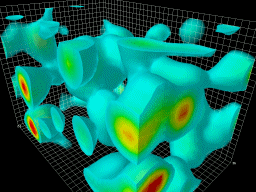There are many discussions on this site about the nature and reality of vacuum fluctuations. The general consensus seems to be that this it falls into the Lie-to-Laymen category. On the other hand, there are simulations like the ones by Derek Leinweber that visualize the nontrivial QCD ground state structure, which he explains as follows
Contrary to the concept of an empty vacuum, QCD induces chromo-electric and chromo-magnetic fields throughout space-time in its lowest energy state. After a few sweeps of smoothing the gluon field (50 sweeps of APE smearing), a lumpy structure reminiscent of a lava lamp is revealed. (The animation was featured in Prof. Frank Wilczek's 2004 Nobel Prize Lecture.)
This clearly seems to suggest that some kind of fluctuation is going on. While it's certainly problematic to speak of particle-antiparticle pairs that pop in and out of existence, I'm wondering if there is nevertheless at least some truth to the fluctuating ground state picture?

